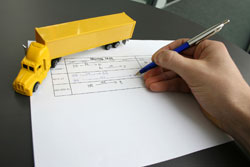Ride-sharing for road freight

A new auction platform aims to replace the pen-and-paper method of journey planning. (© Fraunhofer ITWM)<br>
Many transportation companies in Germany have a serious problem: their trucks are only carrying part loads or returning to base empty. In the German road freight sector, the number of kilometers driven without a load has stagnated at around 20 percent since 2006. But experts expect the volume of road freight to increase dramatically in the near future, and innovative concepts will be needed to prevent a parallel increase in the number of empty trips.
Such journeys are uneconomical for the freight carriers, who can only operate at a profit if their vehicles are used to maximum capacity. For this reason, the companies often take on more orders than they can actually carry using their own fleet. They then select the shipments that can be combined to form profitable, fully loaded round trips. The rest are passed on to subcontractors. But this is an unsatisfactory solution, for two reasons: firstly because subcontractors are expensive, and secondly because the volume of orders is often still too low to allow optimized journey planning for all the vehicles in the fleet.
The solution proposed by researchers at the Fraunhofer Institute for Industrial Mathematics ITWM involves pooling orders and allowing different carriers to pick those that fit best with their available capacity. To help them to do so, the scientists have developed a prototype software platform that will enable freight service providers to set up a collective organization with shared access to orders. “Our software provides an auction platform with integrated planning functions. It offers several advantages over the existing Internet-based freight exchanges used by transportation companies to offer and accept loads,” says Dr. Heiner Ackermann of ITWM. “The online freight exchanges only handle single shipments. At present, it is not possible to group multiple shipments because of the time and effort involved in coordinating transactions over the Internet,” says Ackermann. He illustrates his point with the following example: “A single shipment might be too small to justify the extra mileage, but if it can be combined with a second shipment, the trip could be worthwhile after all. Our auction platform allows multiple offerers and takers to communicate in real time. It enables them to pick the most suitable offers to fill their spare capacity, which in turn reduces costs.” Ackermann’s colleague Hendrik Ewe describes how the auction system works: “Each company lists the orders that don’t fit in with their regular journey planning. After the close of bidding, the best offer is selected and the shipment is assigned. The software uses specially developed algorithms to calculate how the proceeds are to be divided up between the offerer and the taker.”
The platform, which can be interfaced to different databases, is made up of modules: The “marketplace”, where offered shipments are advertised, is installed on a central server. The “bidding assistant” is a client application that runs on terminals at the freight carriers’ premises. The freight companies can use its automatic search function to search for offers in the marketplace. The tool provides route planning suggestions, including the choice of vehicle to carry a specific shipment. “Our software is designed for transportation companies wishing to work together on a long-term basis and build up a relationship of trust,” adds Ackermann. This isn’t possible in the anonymous environment of Internet-based freight exchanges.
In a pilot study using real-life data from the profit centers of a major German freight carrier, the ITWM researchers have demonstrated that their auction platform has genuine cost-saving potential. The researchers are now looking for transportation companies willing to test the concept.
Media Contact
All latest news from the category: Transportation and Logistics
This field deals with all spatial and time-related activities involved in bridging the gap between goods and people, including their restructuring. This begins with the supplier and follows each stage of the operational value chain to product delivery and concludes with product disposal and recycling.
innovations-report provides informative reports and articles on such topics as traffic telematics, toll collection, traffic management systems, route planning, high-speed rail (Transrapid), traffic infrastructures, air safety, transport technologies, transport logistics, production logistics and mobility.
Newest articles

Self-Destructing Cancer Cells: Cutting-Edge RNA Breakthrough
Jülich scientists use novel RNA technology to selectively switch off tumours in the brain. An Adaptable Platform Technology That Destroys Glioblastoma Cancer Cells Using a special RNA molecule, a team…

Endurance Training: Transforming Lives of Heart Failure Patients
Can strength and endurance training be beneficial for patients with a certain form of heart failure? A research team from Greifswald investigated this question together with seven other research centers…

A Wake-Up Call for Mediterranean Shark Protection Against Extinction
Overfishing, illegal fishing and increasing marketing of shark meat pose significant threats to the more than 80 species of sharks and rays that inhabit the Mediterranean Sea, according to a…



